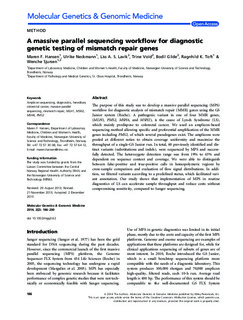| dc.contributor.author | Hansen, Maren Fridtjofsen | |
| dc.contributor.author | Neckmann, Ulrike | |
| dc.contributor.author | Lavik, Liss Anne | |
| dc.contributor.author | Vold, Trine | |
| dc.contributor.author | Gilde, Bodil | |
| dc.contributor.author | Toft, Ragnhild Karlgård | |
| dc.contributor.author | Sjursen, Wenche | |
| dc.date.accessioned | 2019-11-04T07:40:19Z | |
| dc.date.available | 2019-11-04T07:40:19Z | |
| dc.date.created | 2014-01-24T10:00:53Z | |
| dc.date.issued | 2014 | |
| dc.identifier.citation | Molecular Genetics & Genomic Medicine. 2014, 2 (2) | nb_NO |
| dc.identifier.issn | 2324-9269 | |
| dc.identifier.uri | http://hdl.handle.net/11250/2626244 | |
| dc.description.abstract | The purpose of this study was to develop a massive parallel sequencing (MPS) workflow for diagnostic analysis of mismatch repair (MMR) genes using the GS Junior system (Roche). A pathogenic variant in one of four MMR genes, (MLH1, PMS2, MSH6, and MSH2), is the cause of Lynch Syndrome (LS), which mainly predispose to colorectal cancer. We used an amplicon‐based sequencing method allowing specific and preferential amplification of the MMR genes including PMS2, of which several pseudogenes exist. The amplicons were pooled at different ratios to obtain coverage uniformity and maximize the throughput of a single‐GS Junior run. In total, 60 previously identified and distinct variants (substitutions and indels), were sequenced by MPS and successfully detected. The heterozygote detection range was from 19% to 63% and dependent on sequence context and coverage. We were able to distinguish between false‐positive and true‐positive calls in homopolymeric regions by cross‐sample comparison and evaluation of flow signal distributions. In addition, we filtered variants according to a predefined status, which facilitated variant annotation. Our study shows that implementation of MPS in routine diagnostics of LS can accelerate sample throughput and reduce costs without compromising sensitivity, compared to Sanger sequencing. | nb_NO |
| dc.language.iso | eng | nb_NO |
| dc.publisher | Wiley | nb_NO |
| dc.rights | Navngivelse 4.0 Internasjonal | * |
| dc.rights.uri | http://creativecommons.org/licenses/by/4.0/deed.no | * |
| dc.title | A massive parallel sequencing workflow for diagnostic genetic testing of mismatch repair genes | nb_NO |
| dc.type | Journal article | nb_NO |
| dc.type | Peer reviewed | nb_NO |
| dc.description.version | publishedVersion | nb_NO |
| dc.source.volume | 2 | nb_NO |
| dc.source.journal | Molecular Genetics & Genomic Medicine | nb_NO |
| dc.source.issue | 2 | nb_NO |
| dc.identifier.doi | 10.1002/mgg3.62 | |
| dc.identifier.cristin | 1098701 | |
| dc.description.localcode | © 2014 The Authors. Molecular Genetics & Genomic Medicine published by Wiley Periodicals, Inc. This is an open access article under the terms of the Creative Commons Attribution License, which permits use, distribution and reproduction in any medium, provided the original work is properly cited. | nb_NO |
| cristin.unitcode | 194,65,15,0 | |
| cristin.unitcode | 1920,14,0,0 | |
| cristin.unitname | Institutt for klinisk og molekylær medisin | |
| cristin.unitname | Laboratoriemedisinsk klinikk | |
| cristin.ispublished | true | |
| cristin.fulltext | original | |
| cristin.qualitycode | 1 | |

